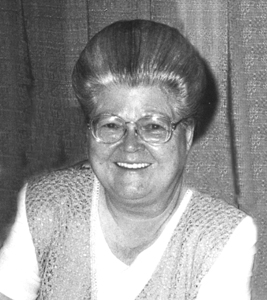NEWS FROM THE HILLS
 After a spectacular snowstorm which tested our endurance and pioneer fortitude, the good Lord has sent us a few days of mild weather and some sunshine to brighten our days. Only a few isolated clumps of slushy snow remain to remind us that it is still winter and we don’t know what may be in store for us yet. Daughter Patty says, “We will make it—we are survivors.”
After a spectacular snowstorm which tested our endurance and pioneer fortitude, the good Lord has sent us a few days of mild weather and some sunshine to brighten our days. Only a few isolated clumps of slushy snow remain to remind us that it is still winter and we don’t know what may be in store for us yet. Daughter Patty says, “We will make it—we are survivors.”
It is true that our forefathers who came from the rugged regions of Ireland and Scotland and carved out homesteads in our hills were brawny men and women who were not afraid of hardships. We hill folk have the same blood running through our veins and can adapt to adverse conditions. If need be, we old timers can go back to a simpler way of life and survive.
In fact, some of us still cling to an older way of life, and also use a lot of the dialect that was common a generation or so ago. It surprises me sometimes when someone questions a word that I use unconsciously. For example, I used the word “razoo” in an earlier column. We have always used that word to mean “make a sudden grab at something” or “a quick lunge.” I found the word “razee” in my “Whistlin’ Dixie” book, which states that it is an old, perhaps obsolete Southern term for a drunken spree.
Mom used a lot of odd words which I thought were “homemade” or words peculiar to our family, but to my surprise, I have found some of them in the dictionary. For example, she used the work “ackempucky” to describe a gooey mess such as wallpaper paste. I found it to mean a food mixture of unknown ingredients or food of jelly-like consistency such as gelatin. She hadn’t made it up after all.
I heard Criss use a word the other day which is rarely heard any more, although his mother used it quite often. She would say, “They didn’t have a ‘haet’ of anything to eat in the house.” I looked it up, and it is an old Scottish word which means “a tiny amount.” One time his sister-in-law used an expression which I had never heard. She remarked, “It was my birthday, but I never named it to him.” I realized that she meant “I never told him.”
Daddy used a lot of dialect in his speech. He would say, “I ain’t got nary a boy that’s got the spizzerinctum to help me.” That word means energy or enthusiasm. Criss says, “I can outwork airy boy I got!” (And he can!) We always (and still do) used the word “slue” to mean a large amount—opposite of “haet.” Such as, “We caught a slue of fish.” It really means to twist or turn something sideways. We use it in that context also, “That car just slued around sigogglin’!”
Mom made “slumgullion” for dinner many times, which was a lot of leftovers with a chopped onion and a jar of whole tomatoes dumped in it. We loved it. The dictionary says that slumgullion is a watery stew, but hers wasn’t awatery. Grandpa O’Dell wore “galluses”—not suspenders, and he packed his clothes in a “grip” (suitcase.)
There were a lot of expressions which meant to beat someone up, such as “I’ll clean his plow for him!” This is still in use today. Another variation is, “I’m gonna clean his clock” and who can blame him if someone hit him “smack-dab” in the face with his fist?
We’ve always used the word “glom” or “gom” to mean making a mess. Daddy would say, “You kids quit glomming around in that food!” I wonder if that word came from “conglomerate” because that does mean “a mix of things.”
I didn’t realize that this expression is dialect, and I am guilty of using it all the time. When someone visits, and are taking their leave, I always say, “come back, you all.” It is an invitation to visit again, and meant sincerely. I thought everyone says it!
Maybe country people are more “clever” when someone visits. That was one of the greatest compliments that Grandpa could say about a family, “They sure are “clever” about the house.” He meant they were friendly and hospitable. Grandma must have been clever—she had company for meals most of the time.
Some words were taboo. I can truthfully say that I never heard a “four letter” word until I started to school. Some of the students used them quite freely, and I was horrified. Daddy frowned on the use of such words as “heck” or “golly.” I remember the first time I said “dad burn it” in front of Mom.
On the other side, some words were too sacred to use in ordinary conversation. We never said “God” or “Lord,” but we used the term “The Good Man.” When we did something wrong, Mom would ask, “Did you ask The Good Man to forgive you?” The name of our Savior was used in prayer or in church, but it was too precious to use lightly. Even now, I cringe when someone utters, “Oh, my God!”
We never said the devil either—we said “the boogerman.” We often heard the expression. “The boogerman is gonna get you if you don’t be good!” I don’t remember being particularly afraid of him. Mom with her peach tree switches was more of a danger.
Times have changed; our speech has changed; people have changed. There is one unchanging element—our Savior. The Bible tells us in Malachi 3:6, “I am the Lord, I change not;” and in Hebrews 13:8 it reads, “Jesus Christ the same yesterday, and today, and forever.”
WINTER STARS
By Sara Teasdale
I went out at night alone;
The young blood flowing beyond the sea
Seemed to have drenched my spirit’s wings—
I bore my sorrow heavily.
But when I lifted up my head
From shadows shaken on the snow,
I saw Orion in the east
Burn steadily as long ago.
From windows in my father’s house,
Dreaming my dreams on winter nights,
I watched Orion as a girl
Above another city’s lights.
Years go, dreams go, and youth goes too,
The world’s heart breaks beneath its wars,
All things are changed, save in the east
The faithful beauty of the stars.
A warm “thank you” goes out to the dear folks who have sent anniversary cards. We were merely teenagers when we married, and Mom made the solemn prediction that “it wouldn’t last.” There have been bumps in the road, and some unexpected curves, but it has been a fruitful journey.
The Lord has been with us and led us all the way. There were times He carried us when we were not able to walk. God supported and comforted us when we lost both sets of parents, a baby granddaughter, and siblings on both sides. He was with us during the joyful times when our grandchildren and great-grandchildren were born. Now He is with us in the winter of our lives.
There is comfort and solace in growing old together. The years have brought us closer to each other. It’s curious that when you are newly married, you think that you are so madly in love that you can’t love any deeper. A person doesn’t really know what love is at that time. It is only after a couple has been married for some time that they experience true, settled love.
WALK SLOWLY
By Adelaide Love
If you should go before me, dear, walk slowly
Down the ways of death, well worn and wide,
For I would want to overtake you quickly
And seek the journey’s ending by your side.
I would be so forlorn not to descry you
Down some shining highroad when I came;
Walk slowly, dear, and often look behind you.
And pause to hear if someone calls your name.
- DAD’S LOVE - July 3, 2020
- HUNTING FOR “MERKLES” - April 24, 2020
- THE SEASON OF GOLD – News From The Hills - November 8, 2019


